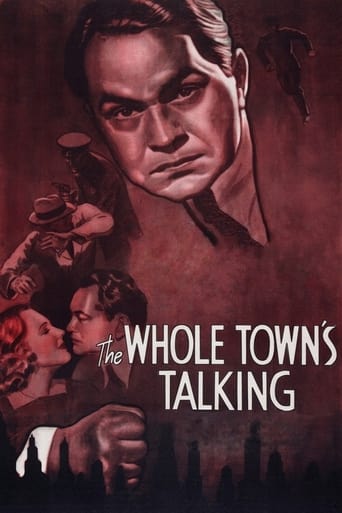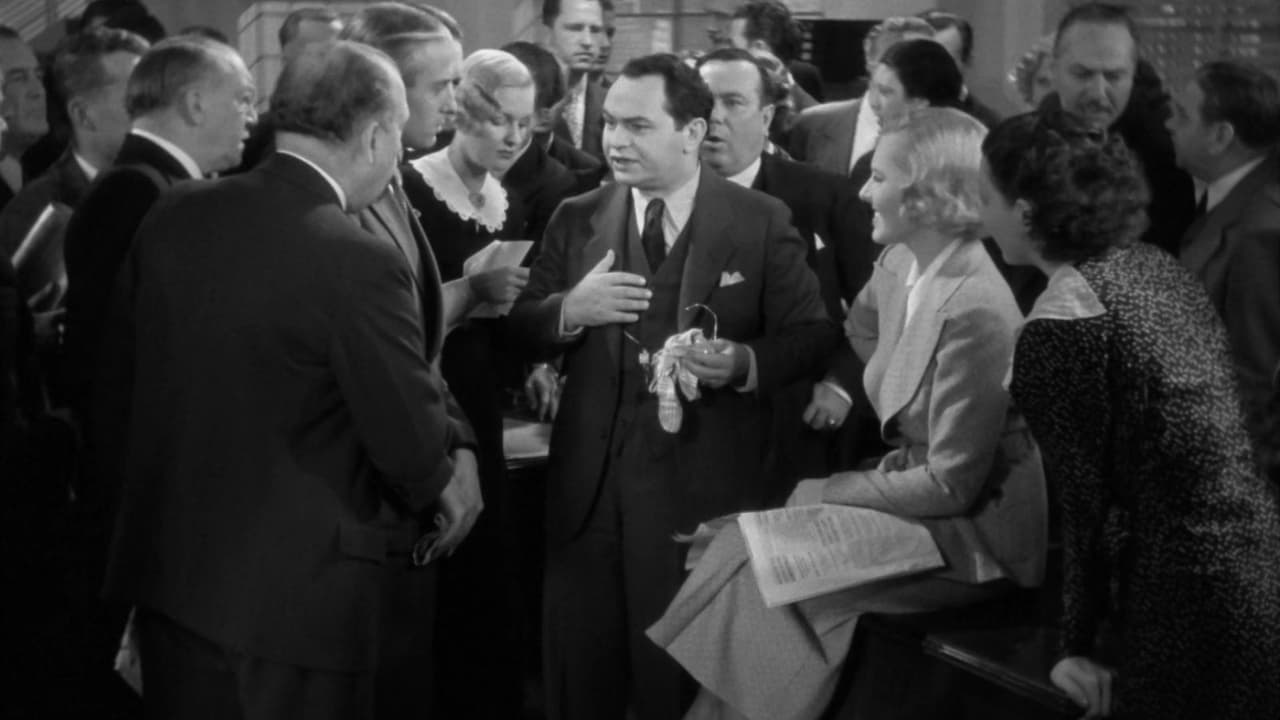kidboots
John Ford, by the mid 1930s, was known for being a man's director and for movies ("Men Without Women", "The Lost Patrol"and "The Informer") that showed the camaraderie and mateship of men under pressure. This movie was completely out of left field. With a comically inventive screenplay by Jo Swerling and it's delight in taking potshots at staid institutions, it could have come from the directorial chair of Frank Capra. John Ford, in years to come, was not particularly keen on it - commenting "It was all right - I never saw it"!! It was much more than that and Edward G. Robinson, who had lampooned his gangster image a couple of years previously in "The Little Giant" had a field day playing a notorious gangster and his innocent double. It also gave him an opportunity to show he could convincingly play a sweet natured, cultured law-abider, who wins the girl, not by force but through the girl's admiration of his character.A hard working mild mannered clerk, Arthur Ferguson Jones (Edward G. Robinson) spends his leisure hours writing romantic fiction and anonymously sending poems to work colleague "Bill" Clark (Jean Arthur) whom he secretly admires. When arch criminal "Killer" Mannion escapes and his picture is plastered over the front page, everybody feels that Jonesy is a dead ringer for the mobster. After innocently ordering lunch in a diner he is identified as Mannion and literally gets the whole town talking!!After the police end up with egg on their faces he is syndicated to write the story of Mannion from the point of view of the man who looks like Mannion of course. Meanwhile the real Mannion shows up and it is to Robinson's great ability as an actor that there is a difference in the way he plays each of them - you definitely can tell them apart - even at the end. Mannion takes the letter that Jonesy has been given by the police, stating that he is not Mannion. Mannion has it by night, when he can rob places in peace without police interference. He is also very interested in the articles Jonesy is writing but after reading the first instalment, in which Jonesy claims that Mannion is a moron with false courage who is only brave when he has a gun, he convinces Jonesy (at gunpoint!!) to write a more colourful, inside story of his jail break. The police at once become suspicious - especially when certain people who have called on Jonesy ("Bill", Mr. Seaver and Aunt Agatha) are kidnapped!!!This is an action packed movie as Mannion plans to have Jonesy gunned down by the police at the bank - the plans go haywire as Jonesy, almost opening the bank door, realises he has left the money on the desk at home and goes back to retrieve it with half the city's police in pursuit!!!This movie was also a milestone for Jean Arthur who had been in movies for almost 12 years and by this time had fled to Broadway after becoming dispirited with too many second rate movies. Variety called her performance "more individualistic" and "sassy" and predicted a brighter future for her which soon came true. Also of interest is an actress billed as "Seaver's Private Secretary". She was Virginia Pine and was George Raft's long time love.Highly Recommended.
edwagreen
John Ford directed this 1935 comedy.Edward G. Robinson has an absolute field-day in a double role portraying a plain, introverted office worker who is mistaken for a major gangster.The fun begins when the gangster breaks out of jail and the usually hilarious Donald Meek identifies our poor worker. Jean Arthur co-stars as a fellow office worker.The confusion goes on and on with the gangster taking refuge at our worker's apartment. The latter has to get a letter from the police to hold onto so that he is not arrested. Later, he is taken in protective custody only to have the real thief take his place so that the latter can knock off someone in jail who has bad-mouthed him.The ending certainly shows that crime does not pay.
ttreybal
Edward G. Robinson is such an awesome actor & he shows it all in this fine film. He plays his typical bad boy gangster side as well as a humble bachelor/office worker and on top of that he can play each of these characters switching roles. Not many actors can pull off this feat and be believable at the same time.Of course we get to enjoy the young Jean Arthur also & she's always a joy to watch. She brings fun and realism to each role she plays.The film had all guns loaded going into it with the screenplay written by Robert Riskin & Jo Swerling based on a story by W.R.Burnett and directed (& co-produced) by John Ford.I thoroughly enjoyed this film!!
theowinthrop
In 1933 Edward G. Robinson had finally essayed a comedy, THE LITTLE GIANT, with passable results. There he tackled the plot of a former racketeer discovering how unworthy the leaders of "good" society could actually be. The same type of a plot would be used again in Robinson's A SLIGHT CASE OF MURDER. But in 1935 Robinson was able to tackle a variant on gangster comedy. It was closer to Dr. Jeckyll and Mr. Hyde, as he played good guy wimp Arthur "Jonesy" Jones and public enemy # 1 Killer Mannion. Identical twins, they find they are drawn together by a physical chance. Mannion discovers that Jones looks so like him that he might be able to avoid police surveillance by switching places with Jones (who, for safety sake, won't try to stop him). Jones finds his job at jeopardy, his safety at jeopardy, and his girl friend "Bill" (Jean Arthur) possibly at jeopardy.There are some choice moments in the film - Ed Brophy, as the chief witness against Mannion, wandering away to his doom accompanied by "Jonesy" (or was it "Jonesy"), and the antics of two particularly dull comic cops (James Donlon and - surprisingly bright in the role - Arthur Hohl). Robinson as patsy and fiend is equally effective, particularly as Mannion decides the time has come to get rid of his harmless doppelganger and take over his place in the world. But will he succeed...or will "Jonesy's" ineptitude and timidity upset his plans.The director of the film was John Ford - it was his first film with either Robinson (who only showed up again in a supporting part in CHEYENNE AUTUMN)and his only one with Arthur. As such it reminds us of his film ARROWSMITH, which was his only film with Ronald Colman and Helen Hayes. In both cases he did well with his stars, and one wishes he had tried a second major film with Robinson, Arthur, Colman, and Hayes later on. But at least he did make these two films.


 AD
AD




